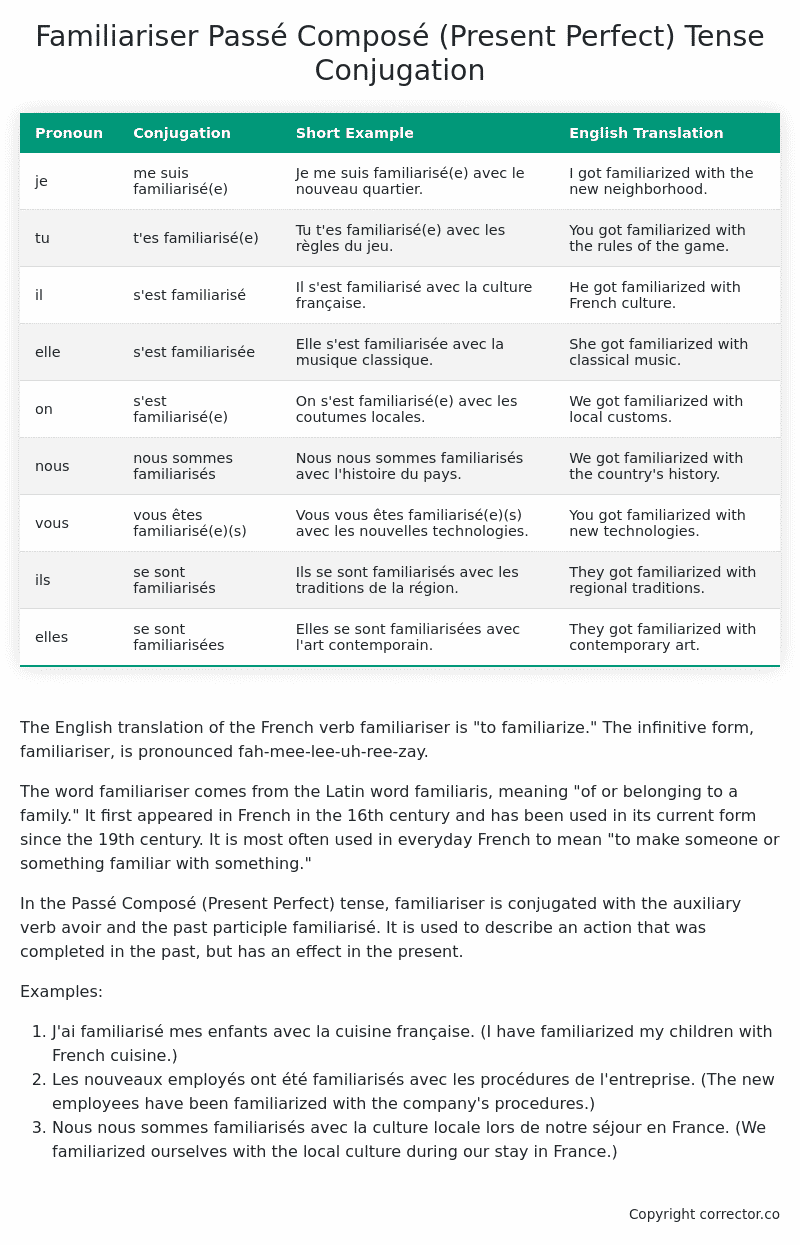Passé Composé (Present Perfect) Tense Conjugation of the French Verb familiariser
Introduction to the verb familiariser
The English translation of the French verb familiariser is “to familiarize.” The infinitive form, familiariser, is pronounced fah-mee-lee-uh-ree-zay.
The word familiariser comes from the Latin word familiaris, meaning “of or belonging to a family.” It first appeared in French in the 16th century and has been used in its current form since the 19th century. It is most often used in everyday French to mean “to make someone or something familiar with something.”
In the Passé Composé (Present Perfect) tense, familiariser is conjugated with the auxiliary verb avoir and the past participle familiarisé. It is used to describe an action that was completed in the past, but has an effect in the present.
Examples:
- J’ai familiarisé mes enfants avec la cuisine française. (I have familiarized my children with French cuisine.)
- Les nouveaux employés ont été familiarisés avec les procédures de l’entreprise. (The new employees have been familiarized with the company’s procedures.)
- Nous nous sommes familiarisés avec la culture locale lors de notre séjour en France. (We familiarized ourselves with the local culture during our stay in France.)
Table of the Passé Composé (Present Perfect) Tense Conjugation of familiariser
| Pronoun | Conjugation | Short Example | English Translation |
|---|---|---|---|
| je | me suis familiarisé(e) | Je me suis familiarisé(e) avec le nouveau quartier. | I got familiarized with the new neighborhood. |
| tu | t’es familiarisé(e) | Tu t’es familiarisé(e) avec les règles du jeu. | You got familiarized with the rules of the game. |
| il | s’est familiarisé | Il s’est familiarisé avec la culture française. | He got familiarized with French culture. |
| elle | s’est familiarisée | Elle s’est familiarisée avec la musique classique. | She got familiarized with classical music. |
| on | s’est familiarisé(e) | On s’est familiarisé(e) avec les coutumes locales. | We got familiarized with local customs. |
| nous | nous sommes familiarisés | Nous nous sommes familiarisés avec l’histoire du pays. | We got familiarized with the country’s history. |
| vous | vous êtes familiarisé(e)(s) | Vous vous êtes familiarisé(e)(s) avec les nouvelles technologies. | You got familiarized with new technologies. |
| ils | se sont familiarisés | Ils se sont familiarisés avec les traditions de la région. | They got familiarized with regional traditions. |
| elles | se sont familiarisées | Elles se sont familiarisées avec l’art contemporain. | They got familiarized with contemporary art. |
Other Conjugations for Familiariser.
Le Present (Present Tense) Conjugation of the French Verb familiariser
Imparfait (Imperfect) Tense Conjugation of the French Verb familiariser
Passé Simple (Simple Past) Tense Conjugation of the French Verb familiariser
Passé Composé (Present Perfect) Tense Conjugation of the French Verb familiariser (this article)
Futur Simple (Simple Future) Tense Conjugation of the French Verb familiariser
Futur Proche (Near Future) Tense Conjugation of the French Verb familiariser
Plus-que-parfait (Pluperfect) Tense Conjugation of the French Verb familiariser
Passé Antérieur (Past Anterior) Tense Conjugation of the French Verb familiariser
Futur Antérieur (Future Anterior) Tense Conjugation of the French Verb familiariser
Subjonctif Présent (Subjunctive Present) Tense Conjugation of the French Verb familiariser
Subjonctif Passé (Subjunctive Past) Tense Conjugation of the French Verb familiariser
Subjonctif Imparfait (Subjunctive Imperfect) Tense Conjugation of the French Verb familiariser
Conditionnel Présent (Conditional Present) Tense Conjugation of the French Verb familiariser
Conditionnel Passé (Conditional Past) Tense Conjugation of the French Verb familiariser
L’impératif Présent (Imperative Present) Tense Conjugation of the French Verb familiariser
L’infinitif Présent (Infinitive Present) Tense Conjugation of the French Verb familiariser
Struggling with French verbs or the language in general? Why not use our free French Grammar Checker – no registration required!
Get a FREE Download Study Sheet of this Conjugation 🔥
Simply right click the image below, click “save image” and get your free reference for the familiariser present perfect tense conjugation!

Familiariser – About the French Passé Composé (Present Perfect) Tense
Formation of the Passé Composé
Set the auxiliary verb with either
Conjugate the auxiliary verb
Add the past participle
Common everyday usage patterns
Narrating Past Events
Sequential Actions
Describing Completed Actions
Interactions with other tenses
Imperfect Tense
Conditional and Future Tenses
Summary
I hope you enjoyed this article on the verb familiariser. Still in a learning mood? Check out another TOTALLY random French verb conjugation!


